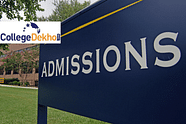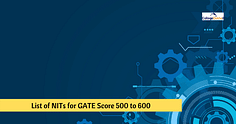IIT Roorkee has released the GATE ECE syllabus. The GATE Electronics & Communication syllabus includes topics like Analog Circuits, Signals and Systems, Engineering Mathematics, Electronics and Devices, Control Systems, etc.

GATE ECE Syllabus - GATE Electronics and Communication Engineering syllabus has been released by IIT Roorkee. Candidates can download the GATE syllabus PDF for ECE on this page. The GATE ECE syllabus includes 8 sections namely Analog Circuits, Signals and Systems, Engineering Mathematics, Networks, Electronics and Devices, Digital Circuits, Control Systems, Communications and Electromagnetics. Along with these sections, there is a General Aptitude section also contained in the GATE ECE syllabus that candidates have to prepare. While studying for the GATE exam, candidates must study all the topics of the syllabus without skipping any part. The GATE ECE exam will include a total of 65 questions, comprising 10 on general aptitude and 55 on electronics and communication engineering. The GATE Electronics and Communication will have a total of 100 marks.
| Official GATE Electronics and Communication Engineering Syllabus PDF |
|---|
Read the full article to get the GATE syllabus for electronics and communication engineering along with exam patterns, important topics, preparation tips, topic-wise weightage, and more.
Complete GATE ECE Syllabus
Through the GATE ECE syllabus candidates will learn about the main topics and subjects that they need to focus on in order to excel in the test. Aside from General Aptitude and Engineering Mathematics, which are included in other engineering specializations, there are seven more subjects that are exclusive to Electronics and Communication Engineering. Check the 8 sections included in the GATE ECE syllabus.
Section | Section Name |
|---|---|
1 | Engineering Mathematics |
2 | Networks, Signals and Systems |
3 | Electronics and Devices |
4 | Analog Circuits |
5 | Digital Circuits |
6 | Control System |
7 | Communications |
8 | Electromagnetics |
Section Wise GATE ECE Syllabus
Electronics and communications engineers design and supervise the production of communications and broadcast systems. The electronics and communication engineer job profiles include working on various complex issues. Therefore, the authorities designed the GATE Syllabus in such a manner that students obtain all of the information and abilities that they would need when they begin their professional careers.
Candidates can check the detailed section-wise official GATE ECE syllabus given below.
GATE ECE Syllabus (Section 1): Engineering Mathematics
The section of GATE ECE syllabus is Engineering Mathematics which is a significant and high-scoring topic. Candidates who prepare properly can get 13 marks in this section. This section contains seven subtopics critical to earning a high exam score. Check the section 1 GATE ECE syllabus given below.
Calculus:
Mean value theorems, theorems of integral calculus, evaluation of definite and improper integrals, partial derivatives, maxima and minima, multiple integrals, line, surface, and volume integrals, Taylor series.
Linear Algebra:
Vector space, basis, linear dependence and independence, matrix algebra, Eigenvalues and Eigenvectors, rank, solution of linear equations- existence and uniqueness.
Differential Equations:
First-order equations (linear and nonlinear), higher order linear differential equations, Cauchy's and Euler's equations, methods of solution using a variety of parameters, complementary function, and particular integral, partial differential equations, variable separable, method, initial and boundary value problems.
Probability and Statistics:
Mean, median, mode, standard deviation, combinatorial probability, probability distributions, binomial distribution, Poisson distribution, exponential distribution, normal distribution, joint and conditional probability.
Vector Analysis:
Vectors in plane and space, vector operations, gradient, divergence and curl, Gauss's, Green's, and Stokes’ theorems.
Complex Analysis:
Analytic functions, Cauchy’s integral theorem, Cauchy’s integral formula, sequences, series, convergence tests, Taylor and Laurent series, residue theorem.
GATE ECE Syllabus (Section 2): Networks, Signals and Systems
The Networks, Signals, and Systems component of the GATE electronics and communication engineering syllabus introduces key ideas in the sub-area Network of signals and systems and circuit analysis of Continuous and Discrete-time signals and systems. This is the first core subject of the test, Electronics and Communication Engineering. Go through section 2 of the GATE ECE syllabus given below.
- Circuit Analysis: Norton’s theorem, reciprocity, Node and mesh analysis, superposition, Thevenin's theorem. Sinusoidal steady state analysis: phasors, complex power, maximum power transfer. Time and frequency domain analysis of linear circuits: RL, RC, and RLC circuits, Solution of network equations using Laplace transform.
- Linear 2-port network parameters, wye-delta transformation.
- Continuous-time Signals: Fourier series and Fourier transform, sampling theorem and applications. Discrete-time Signals: DTFT, DFT, z-transform, discrete-time processing of continuous-time signals. LTI systems: definition and properties, causality, stability, impulse response, convolution, poles and zeroes, frequency response, group delay, phase delay.
GATE ECE Syllabus (Section 3): Electronic Devices
There are various key subtopics in this section of the GATE electronics and communication engineering syllabus. One of the essential subtopics of Electronic Devices for the forthcoming test is Integrated Circuit Fabrication Process and Semiconductors. The following subjects are covered in the Electronic Devices portion of the GATE ECE syllabus:
- Energy bands in intrinsic and extrinsic semiconductors, equilibrium carrier concentration, and direct and indirect band-gap semiconductors
- Carrier Transport: diffusion current, drift current, mobility and resistivity, generation and
- recombination of carriers, Poisson and continuity equations
- P-N junction, Zener diode, BJT, MOS capacitor, MOSFET, LED, photodiode and solar cell
GATE ECE Syllabus (Section 4): Analog Circuits
Analog Circuits include subjects such as simple op-amps, circuit analysis and applications of diodes, voltage reference circuits, waveshaping, and many more. Candidates can check section 4 of GATE ECE syllabus given below.
- Diode Circuits: clipping, clamping, and rectifiers.
- BJT and MOSFET Amplifiers: biasing, AC coupling, small signal analysis, frequency response.
- Current mirrors and differential amplifiers.
- Op-amp Circuits: Amplifiers, summers, differentiators, integrators, active filters, Schmitt triggers, and oscillators.
GATE ECE Syllabus (Section 5): Digital Circuits
Digital Circuits covers just a few subjects that are crucial to the ECE GATE syllabus. Candidates are recommended to pay great attention to preparing this portion. Go through section 5 of the GATE ECE syllabus given below.
- Sequential Circuits: latches and flip-flops, counters, shift registers, finite state machines, propagation delay, setup and hold time, critical path delay.
- Number Representations: binary, integer, and floating-point- numbers.Combinatorial circuits: Boolean algebra, minimization of functions using Boolean identities and Karnaugh map, logic gates and their static CMOS implementations, arithmetic circuits, code converters, multiplexers, and decoders
- Data Converters: sample and hold circuits, ADCs, and DACs.
- Semiconductor Memories: ROM, SRAM, DRAM
- Computer Organization: Machine instructions and addressing modes, ALU, data path, and control unit, instruction pipelining
GATE ECE Syllabus (Section 6): Control System
The GATE ECE syllabus control system section contains key topics like State variable model and solution of state equation of LTI systems, Basic control system components, and so on. Check section 6 of GATE ECE syllabus provided below.
- Basic control system components
- Feedback principle
- Transfer function
- Block diagram representation
- Signal flow graph
- Transient and steady-state analysis of LTI systems
- Frequency response
- Routh-Hurwitz and Nyquist stability criteria
- Bode and root-locus plots
- Lag, lead, and lag lead compensation
- State variable model and solution of state equation of LTI systems
GATE ECE Syllabus (Section 7): Communications
Section 7 of GATE ECE Syllabus comprises subjects such as Hamming codes, digital communications, random processes, fundamentals of error correction, and CRC. Candidates can check section 7 of GATE ECE syllabus given below.
- Random Processes: autocorrelation and power spectral density, properties of white noise, filtering of random signals through LTI systems
- Fundamentals of error correction, Hamming codes, CRC
- Information Theory: entropy, mutual information and channel capacity theorem.
- Analog Communications: amplitude modulation and demodulation, angle modulation and
- demodulation, spectra of AM and FM, superheterodyne receivers
- Digital Communications: PCM, DPCM, digital modulation schemes (ASK, PSK, FSK, QAM), bandwidth, inter-symbol interference, MAP, ML detection, matched filter receiver, SNR and BER
GATE ECE Syllabus (Section 8): Electromagnetics
- Maxwell’s Equations: differential and integral forms and their interpretation, boundary conditions, wave equation, Poynting vector
- Transmission Lines: equations, characteristic impedance, impedance matching, impedance transformation, S-parameters, Smith chart
- Plane Waves and Properties: reflection and refraction, polarization, phase, and group velocity, propagation through various media, skin depth
- Rectangular and circular waveguides, light propagation in optical fibers, dipole and monopole antennas, linear antenna arrays
GATE General Aptitude Syllabus
IISC Bangalore has included the General Aptitude section in each GATE paper. The GATE general aptitude section will carry 15 marks out of 100 in the exam and the rest 85 marks will be covered by core specialization engineering subjects. Candidates can check the GATE general aptitude syllabus given below.
Section | Topics |
|---|---|
Quantitative Aptitude |
|
Analytical Aptitude |
|
Verbal Aptitude |
|
Spatial Aptitude |
|
GATE ECE Exam Pattern
The GATE exam pattern includes duration, section-wise mark weightage, marking scheme, etc. Candidates can check the GATE exam pattern for electronics and communication engineering specialization.
Particular | Details |
|---|---|
Exam Mode | Online Mode |
Duration | 3 Hours |
Total Questions | 65 |
Total Marks | 100 |
Sections | General Aptitude, Mathematics, Electronics and Communication Engineering (ECE) based Questions |
Type of questions | MCQs, MSQs, & NATs |
Negative Marking | For MCQs only |
GATE ECE Marking Scheme
Candidates can check out the GATE ECE marking scheme below.
Subject Name | Number of Questions | Marks Distribution | Marks percent weightage | Negative Marking | Total time |
|---|---|---|---|---|---|
Electronics and communication engineering (ECE) | 45 | (25 x 1) (30 x 2) | 85 | ||
Engineering Mathematics | 10 | ||||
General Aptitude | 10 | 5 x 1 5 x 2 | 15 | 1/3 for 1 mark Que in MCQ 2/3 for 2 marks ques in MCQ No Negative marking in MSQ and NAT | |
GATE ECE Syllabus Weightage
Based on the previous year's trends, the weightage of the topics incorporated in the GATE ECE syllabus is as follows for 1- and 2-mark questions. Candidates have to schedule their preparation process based on the weightage allocated to the GATE Syllabus for Electronics and Communication Engineering. The table below helps candidates comprehend the significance of each area of the ECE topic. Engineering and general aptitude Mathematics and science are two high-scoring areas in which applicants should put forth the extra effort. Aside from these two areas, Communication and Network theory are crucial for the test.
Go through the table given below to check the GATE ECE Syllabus weightage.
Subjects | Number of 1 Mark Questions | Number of 2 Marks Questions | Total Marks | Weightage Analysis |
|---|---|---|---|---|
Digital Circuits | 3 | 3 | 8 | 9% |
Electronic Devices | 2 | 2 | 6 | 6% |
Control Systems | 1 | 2 | 5 | 5% |
Analog Circuits | 3 | 2 | 7 | 7% |
General Aptitude | 5 | 5 | 15 | 15% |
Networks Theory | 2 | 5 | 12 | 12% |
Engineering Mathematics | 5 | 4 | 13 | 13% |
Signal Systems | 4 | 3 | 10 | 10% |
Communication | 3 | 5 | 13 | 13% |
GATE ECE Preparation Tips
Candidate must have a proper preparation plan to score the GATE cutoff marks. Many candidates participate in the GATE exam, making the competition level high. Therefore, candidates must have a solid study plan to excel in the exam.
Go through the GATE ECE preparation tips given below.
- The first and most important stage is to develop a well-thought-out strategy and GATE study timetable
- Learning everything will be good but that will turn into useless if the candidate is unfamiliar with the test GATE ECE syllabus. Therefore, before beginning preparation for GATE, it is vital to review the GATE curriculum of Electronics and Communication Engineering and study all the topics of the syllabus
- Candidates should refer to the best GATE ECE books for preparation that include all the topics and have a better explanation
- Once candidates are through with the GATE Syllabus for Electronics and Communication Engineering, they must attempt the previous year's papers and mock tests.
- Time to time revision should be done to avoid forgetting of what students have studied so far.
- Candidates should work on their time management skills so that they can complete their paper in time.
- In addition to studying and practicing, candidates must not take the stress and relax. Take proper sleep and eat healthy.
Best GATE ECE Books
To prepare for the GATE electronics and communication engineering exam, candidates must refer to the best author, and expert-recommended GATE books only for their preparation. Candidates can check the best GATE ECE books given below.
Reference Books | Book Name |
|---|---|
Electronic Devices |
|
Signal Systems |
|
Digital System |
|
General Aptitude |
|
MCQ book |
|
Analog Circuits |
|
Communication System |
|
Control System |
|
Maths |
|
Network |
|
Electromagnetics |
|
CollegeDekho wishes you the best for your upcoming GATE exam. We hope that this post on the GATE ECE syllabus is helpful and informative.
















Similar Articles
List of NIT Colleges Accepting GATE 2025 Score 500-600
What is a Good Score in GATE Civil Engineering (CE) 2025?
What is a Good Score in GATE Biotechnology (BT) 2025?
COMEDK 2025 Chapter Wise PYQs for Chemistry
IIT Delhi Highest Package 2024-25: Highlights of Placements, Top Recruiters
COMEDK Chapter Wise PYQs for Physics